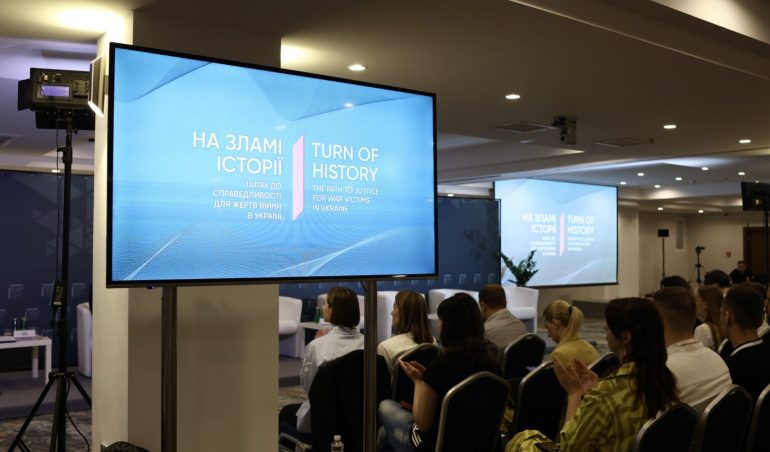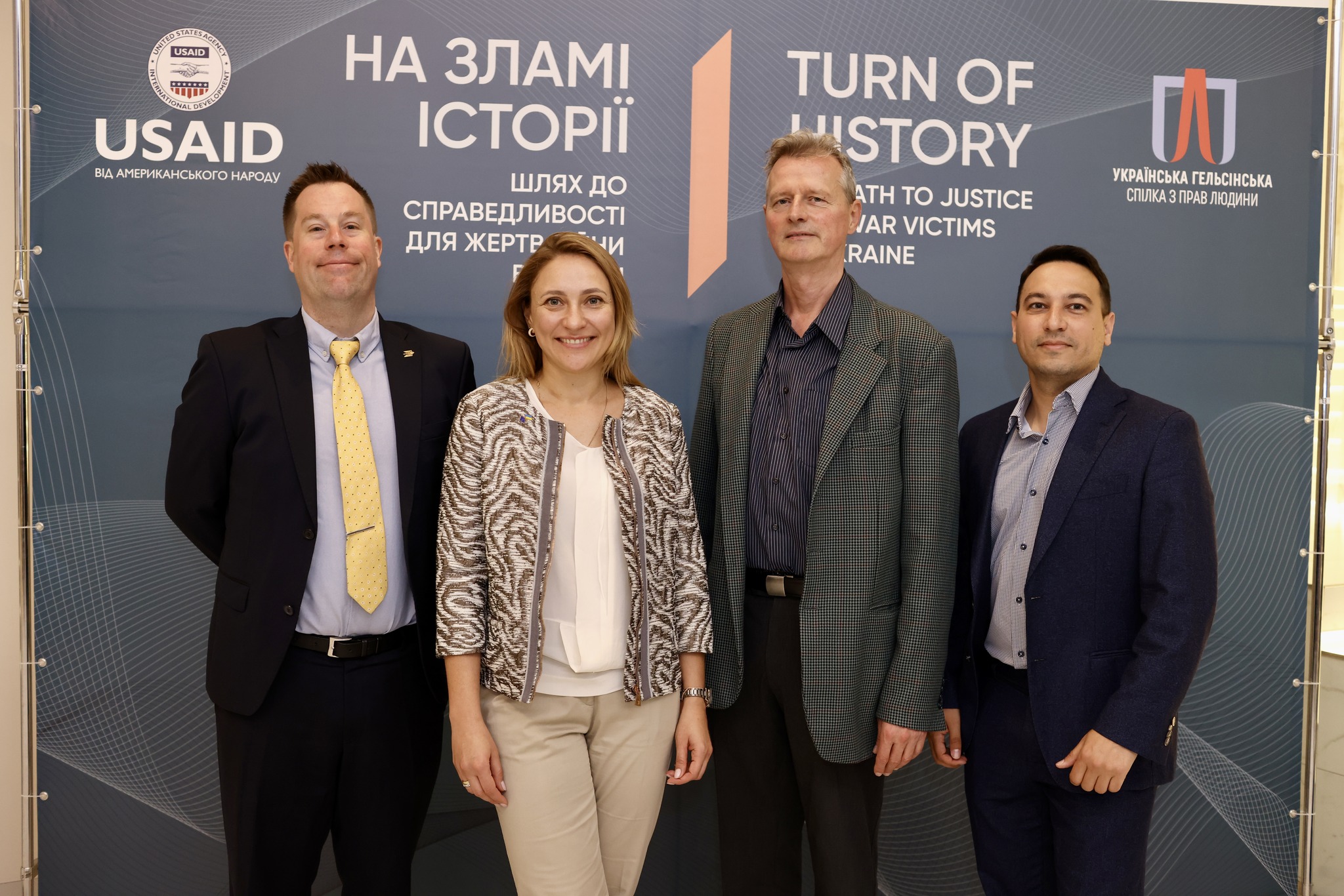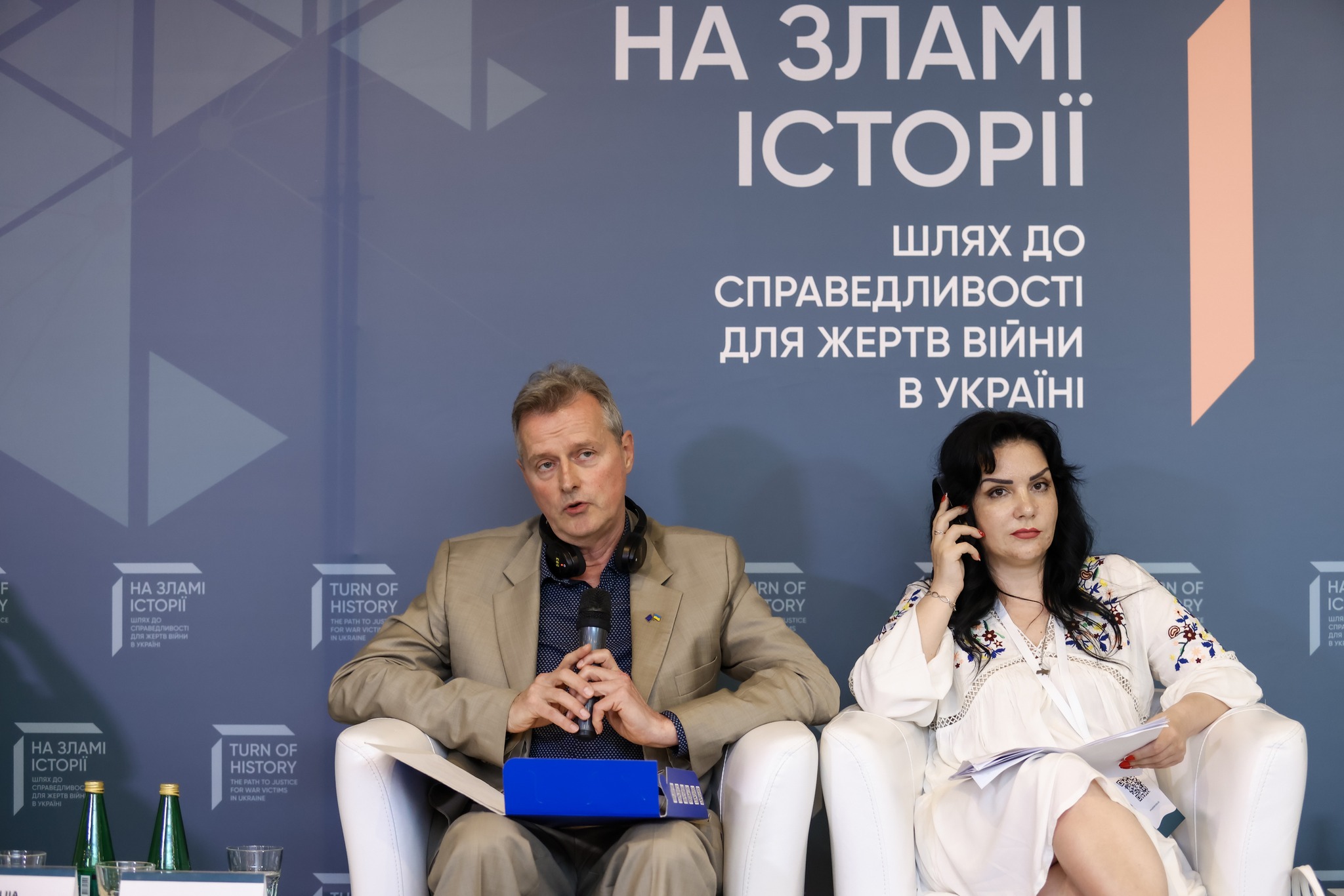Ukraine’s Struggle for Justice: Balancing Hope and Realism for War Victims
June 14, 2024
For ten long years, Ukraine has been suffering from Russian military aggression that has profoundly impacted its citizens. A recent sociological study by the Kharkiv Institute of Social Research reveals a staggering statistic: nearly 80% of Ukrainians identify as victims of the war. This harrowing figure underscores the widespread trauma experienced across the nation, a reality that was starkly highlighted during the recent conference “Turn of the History: Justice for the Victims in Ukraine” held in Lviv last week.
Organised by the Ukrainian Helsinki Human Rights Union and the USAID Human Rights in Action Program, the conference served as a crucial platform for discussing the myriad challenges in achieving justice for war victims. Since the start of the war in Ukraine in 2014, and with Russia’s full-scale invasion in 2022, the need for justice for Ukrainian victims of war has only intensified. The EU Advisory Mission (EUAM) Ukraine partnered in this event, with Mission experts participating in several panel discussions alongside government officials, lawyers, journalists, historians, and other experts.
The topics for panel discussions were very timely and relevant but tough. The panellists, together with other participants, had to face the fierce reality of war when there is a need to speak up about challenges to find the best possible solutions.
Justice for All: Is it possible or unrealistic?
“Past experiences have taught us not only that justice processes are time-consuming, but that these are unable to be as comprehensive as victims wish them to be. The sheer number of criminal incidents under investigation only further necessitates the need for clear communication about what the public can expect,” underlined Shan Patel, EUAM Senior Advisor on Prosecution of International Crimes, at the panel discussion dedicated to the question of what victims can expect in terms of accountability for international crimes.

Justice processes are notoriously slow and often fall short of victims’ comprehensive expectations. Communication about realistic outcomes is essential. The International Criminal Court, often seen as a beacon of hope by victims, faces natural limitations in scope and impact on victims’ daily life. That is normal, considering the practical consequences arising out of the principle of complementarity. In terms of reparations, as opposed to individual awards, collective, community-based reparations are often a more viable outcome.
Transitional Justice mechanisms and non-criminal accountability processes should also be considered. Victims frequently seek acknowledgment of their pain and suffering, not just legal judgments.
Despite that accountability processes are long-winded, expensive, and often frustrating, victims should not despair. Although not without its flaws, the progress that has—and is being—made is significant. Ukraine has displayed an understanding of the need for a holistic approach, for instance by creating new institutions such as the Victim and Witness Coordination Centre of the Office of the Prosecutor General. Furthermore, the mere fact that adjustments such as the integration of a more victim-centred approach in the investigative and prosecutorial processes is occurring while an armed conflict is ongoing is an accomplishment not to be understated.
”Let us also not discount how, internationally, there have been few armed conflicts in which support for victims but also more broadly has been this steadfast and criminal accountability efforts so resolute,” concludes Shan Patel.
The Challenge of Compensation to Victims: material vs non-material
The issue of compensation is another significant hurdle. “Do Ukrainians believe in the possibility of receiving reparations from Russia? In short, no,” explains Andriy Chernousov, the Vice-Chairman of the Board of the Kharkiv Institute for Social Research. Most respondents (61%) are sceptical about reparations from Russia, while 26% believe it could happen in the long term. Only 6% are optimistic about seeing reparations soon.
However, alongside material damage, Ukrainians have also faced other damages from the conflict. It is also important to ensure compensation for non-material and moral damages. The same survey shows that because of the war, almost 40% of Ukrainians suffered mental trauma; 19% mentioned that their chronic diseases worsened or they developed new ones.
EU and other international standards require states to have a state funded mechanism for compensation for violent crimes. Ukraine does not yet have such a general mechanism. The EU Compensation Directive and the Council of Europe’s Convention on Compensation to victims of violent crimes point out this gap, which, if addressed, could greatly benefit war crime victims, especially those belonging to vulnerable groups. The EU Victims’ Rights Directive outlines general rights for victims, and Ukraine is aligning with these standards, focusing on preventing secondary victimisation and increasing access to psychological support and legal representation.
“An important principle, established as a best European practice, is that there should be no hierarchy among victims. But we are obliged to prioritise when we are faced with a limited budget. It seems that there is a growing consensus among international and Ukrainian experts that we should prioritise the most vulnerable. This will generally include torture victims and CRSV survivors,” stresses Ola Quarnstrom, EUAM Senior Adviser on Vulnerable Groups. We must not let the situation arise where such vulnerable victims as CRSV survivors are struggling to get basic support to function through the day. The state policy should protect them as a priority group.
Justice, Reconciliation and Post-War Settlement
During this panel, experts discussed the possibilities of achieving justice-based recovery and approaches to solving sensitive issues, including collaboration, amnesty, and reintegration of liberated territories.
The vast majority of respondents, over 80%, agree on the need for criminal accountability for collaborating with Russians in the occupied territories. “We broke this question down further. Should teachers, doctors, and utility workers be punished for collaboration? Over 50% of respondents support the punishment of officials of pseudo-authorities, law enforcement, and government officials. Support for holding accountable those who stayed in occupation to continue providing social services is significantly lower,” explains Andriy Chernousov.

To ensure social cohesion and effective administration in liberated territories, Ukraine should focus on prosecuting serious offenders while developing a comprehensive transitional justice strategy. This strategy should involve collaboration with various stakeholders, including survivor groups, NGOs, and international partners, to ensure restorative justice.
“The EU’s approach to transitional justice can serve as a model, emphasising criminal justice, truth-seeking, reparations, and guarantees of non-recurrence. Ensuring that transitional justice processes are inclusive, context-specific, and rights-based will be crucial for Ukraine’s reintegration efforts,” says Guido Oestreich, EUAM Head of Criminal Justice Unit.
The EU’s action plan on human rights and democracy for 2020-2024 highlights the importance of closing the accountability gap and supporting transitional justice in non-EU states. The EU’s comprehensive approach includes reforming national criminal legislation, developing prosecutorial and judicial capabilities, and providing long-term protection and assistance for witnesses and victims. It promotes truth-seeking initiatives based on international law and best practices and encourages victim-focused participatory approaches to reparation policies to ensure justice and rehabilitation.
Moreover, the EU supports security and justice sector reforms aimed at establishing civilian control and governance, adopting vetting procedures and codes of conduct aligned with international human rights standards. And, as it was outlined by Ivanna Ilchenko, Legal Reform Officer at the EUAM, it is important to comply with international obligations under the Fourth Geneva Convention regarding the rights of civilians under occupation in relation to the criminalization of collaborative activities. The EU’s guiding principles for transitional justice emphasise national and local ownership, participatory processes, and inclusivity, ensuring that victims and civil society are actively involved.


